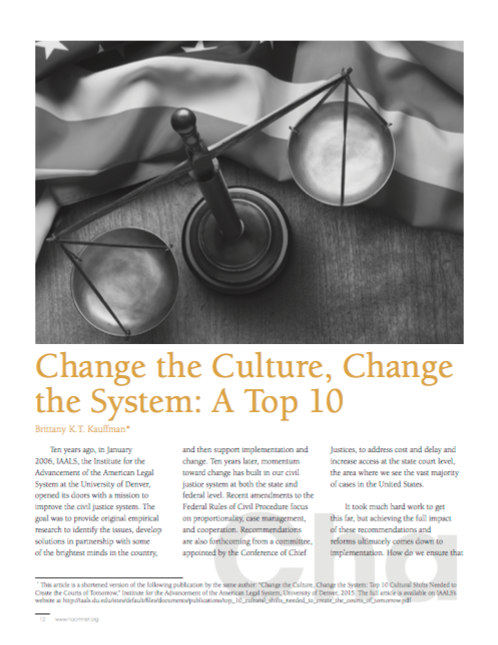A Top Ten for Changing Legal Culture in the United States
 The April edition of Court Manager—the monthly publication of the National Association for Court Management (NACM)—featured an article by Brittany Kauffman, Director of IAALS’ Rule One Initiative. Entitled “Change the Culture, Change the System: A Top 10,” the article discusses IAALS’ mission to improve America’s civil justice system and the ten ways to drive lasting change.
The April edition of Court Manager—the monthly publication of the National Association for Court Management (NACM)—featured an article by Brittany Kauffman, Director of IAALS’ Rule One Initiative. Entitled “Change the Culture, Change the System: A Top 10,” the article discusses IAALS’ mission to improve America’s civil justice system and the ten ways to drive lasting change.
“To make significant changes to the system, we must make changes in the pervasive legal culture.”
Much has been learned through pilot projects and rules changes in the last decade, and IAALS has taken the next step: listening to the judges, court administrators, and lawyers to gain their input and insight on the cultural changes that are needed, the challenges, and possible solutions. IAALS boiled the consistent themes from these conversations down to the following “Top 10,” first released as part of our publication Change the Culture, Change the System: Top 10 Shifts Needed to Create the Courts of Tomorrow:
- Back to Our Professional Roots – Law needs to be a collegial and civil profession first and foremost.
- Guided by Justice – The focus should be on justice, not on winning at all costs.
- Dig Deeper, Earlier – Lawyers need to develop a deep understanding of their case early in the process.
- A New Approach to Discovery – We need to change how we view discovery.
- Engaged Judges – Judges need to be engaged, accessible, and guided by service.
- Courts Taking Ownership – The courts need to be accessible, relevant, available to serve, and responsible for every case.
- Efficiency Up the Court Ladder – We need to utilize everyone within the court structure more effectively and efficiently.
- Smart Use of Technology – We need to use technology for efficiency, effectiveness, and clarity—in the courts, in law practice, and in ensuring the legal system is accessible for non-lawyers.
- Valuing Our System – We need to value our court system, our judges, and our juries.
- Realign Incentives – We need to focus on the incentives driving lawyers and work to align them with our goals for improvement of the system as a whole.
“It is far easier merely to talk about the need for change than actually to change,” Kauffman says.
“Enough talk. Now is the time for each of us to take responsibility for changing our own approach and biases, and to join in a common mission to achieve a truly just, speedy, and inexpensive dispute resolution system.”





